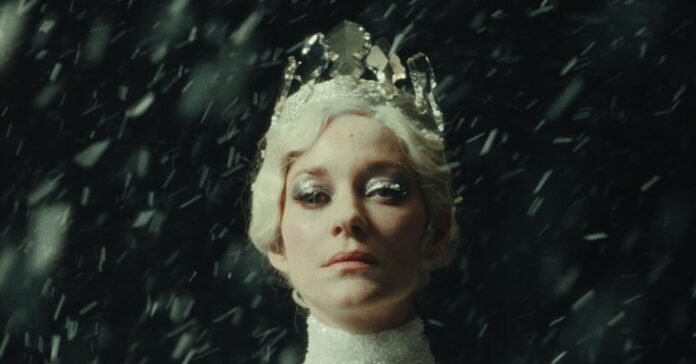Dir: Lucile Hadzihalilovic. Fr/Ger. 2025. 118mins
Numerous variations and appropriations – amongst them Disney’s Frozen – have diluted the sheer weirdness of Hans Christian Andersen’s fairy story The Snow Queen, a story of fine and evil that can also be one younger lady’s investigative quest for a lacking boyfriend who has come beneath the affect of an older girl. In her ravishingly shot fourth characteristic, set within the mid Nineteen Seventies, Lucile Hadzihalilovic takes the boy out of the image. Instructed by the allusive body of a feminine teenage runaways’s encounter with a film star diva performed by Marion Cotillard, who’s taking pictures a brand new model of The Snow Queen, this can be a story of womanhood at a crossroads: its two characters one way or the other turn into one, a earlier than and an after, slowly circling, testing, and taking inventory of each other.
A narrative of womanhood at a crossroads
Since Hadzihalilovic and Cotillard first teamed up within the director’s revelatory first characteristic, Innocence, in 2004, the actress has discovered international stardom whereas the filmmaker has ploughed her personal idiosyncratic route in two different fantasy-tinged dramatic options; Evolution (2015) and Earwig (2021). Hadzihalilovic is a director who refuses to compromise her very distinctive imaginative and prescient and that’s the case right here, even when The Ice Tower, which bows in Berlin Competitors, is her greatest movie to this point; completely lovely in each body with a breakout lead efficiency by younger French actress Clara Pacini.
To name The Ice Tower ‘standard’ could be one thing of a stretch, however there’s not one of the wanton oddness of, say, Earwig. There a woman had precise enamel of ice; right here, the icy coronary heart of Cotillard’s jaded, broken film star Cristina is extra metaphorical. With its lengthy, dusty, amplified silences that sound just like the run-out groove of a vinyl document, its glacial ambiance, theme and pacing, The Ice Tower is, paradoxically, each Hadzihalilovic’s first stab at breaking out into mainstream exhibition berths and never a completely simple promote. Festive season counter-programming gives a technique out of the deadlock.
With eyes like darkish swimming pools and the poise of a ballerina (a poster we glimpse for Powell and Pressburger’s The Crimson Sneakers nods at an affect right here), Pacini’s Jeanne is clearly the misfit within the poor mountain household whose rustic eating desk she awkwardly joins close to the beginning of the motion. Quickly sufficient she’s run away over snowed-in Alpine passes, missed solely by a a lot youthful sister with whom she shares a love of Andersen’s celebrated fable. Jeanne takes together with her solely a handful of agate beads which might be, as any fairy story fan will know, helpful forex when on a quest.
Her vacation spot, after a close to assault whereas hitch-hiking, is a close-by city (really Bolzano, in Italy’s Sud Tirol area), the place, drained and hungry, she ultimately finds a sleep house in what seems to be a semi-abandoned constructing. Quickly sufficient, Jeanne will uncover that she has slipped into the behind-the-scenes interstices of a movie set. And the movie, starring Cotillard’s troublesome, imperious diva, is The Snow Queen.
Initially seen by slits within the backdrop, this movie within the making is forbidden territory that Jeanne regularly slips into, in ways in which require a sure magical-realist suspension of disbelief. She finds work first as an additional after which because the stand-in for the younger Gerda of Andersen’s story, performed by a tearful actress upon whom Cristina has positioned a curse by way of a bady-wrangled (and later badly-mangled) crow. August Diehl turns up as Max, a caddish, melancholy outdated buddy of Cristina’s who introduces himself to Jeanne as her physician – a grown-up method of claiming ‘pusher’. The director’s companion Gaspar Noe performs Dino, the briefly-glimpsed director of the film-within-a-film, that we battle to situate in The Ice Tower’s Nineteen Seventies setting based mostly on what we see right here – in all honesty it seems extra Lucile Hadzihalilovic than, say, Dario Argento.
Jeanne is one thing of a magpie – she steals a many-faceted crystal drop from the Snow Queen’s costume, and even assumes the identify, Bianca, of a lady whose purse she finds on the streets of this chilly, rationalist city, with its streets and piazzas straight out of a Giorgio De Chirico portray. A lot of her rapport with Cristina, whose spell she regularly falls beneath, is made up of silent glances. Each phrase stated – as when Jeanne, in Cristina’s dressing room, narrates a trauma involving her delivery mom – is a danger.
Together with her steely, judgmental eyes, Cristina appears a monster cast out of the terrors and self-consciousness of adolescence – a transitional age that’s Hadzihalilovic’s abiding theme. The form-shifting refractions of this time of life are given visible kind right here in a collection of dreamy ice-crystal montages set to the music of French composer Olivier Messiaen.
Manufacturing firms: 3B Productions
Worldwide gross sales: Goodfellas gross sales@goodfellas.movie
Producer: Muriel Merlin
Screenplay: Lucile Hadzihalilovic, Geoff Cox
Cinematography: Jonathan Ricquebourg
Manufacturing design: Julia Irribarria
Modifying: Nassim Gordji Tehrani
Foremost forged: Marion Cotillard, Clara Pacini, August Diehl, Gaspar Noe, Marine Gesbert
